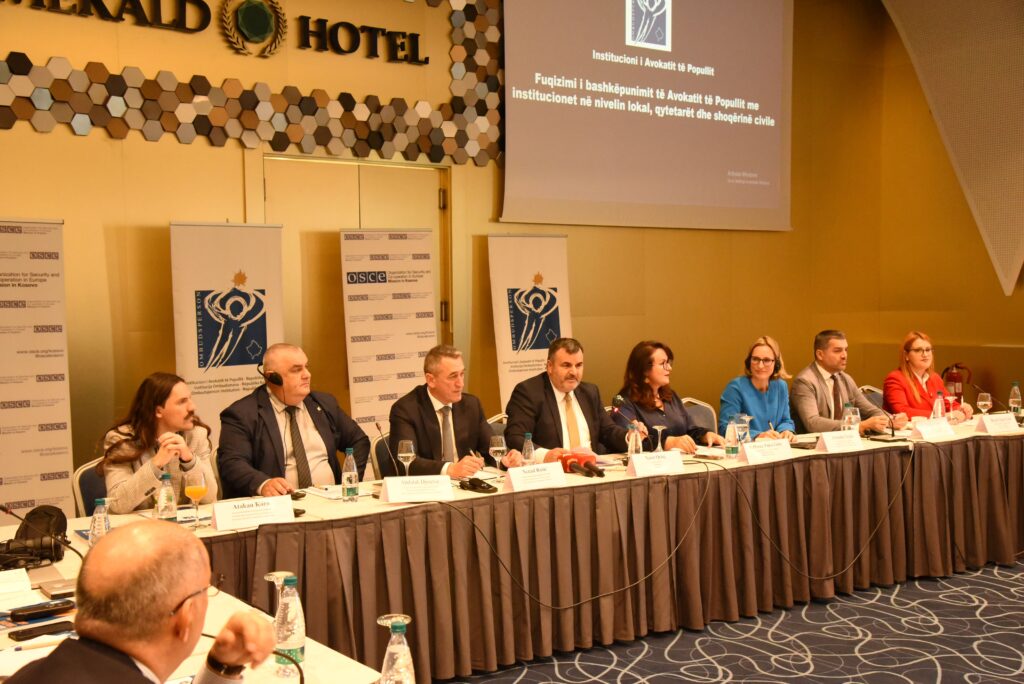
Ombudsperson’s Institution presented the findings from meetings with citizens
Pristina, November 8, 2024 – The Ombudsperson’s Institution in cooperation with the OSCE mission in Kosovo organized a round table in which the findings were presented from the meetings held in several municipalities of Kosovo regarding the state of human rights and freedoms, with special emphasis on the rights of communities.
Ombudsperson, Mr. Naim Qelaj said that it was an excellent opportunity to talk with citizens, civil society organizations and local authorities about many issues that they considered important and that were related to the mandate of the Ombudsperson.
Mr. Qelaj said that the municipalities are the authorities that deal with the daily and practical problems of the citizens’ lives, and the receipt of necessary services that affect the well-being and lives of the citizens depends on their work.
“Social policies have not yet managed to be a priority of local governments, dominating development policies in infrastructure, and despite investments, in many cases they have not met basic and vital needs, such as supply of drinking water, sewerage and other issues,” said Mr. Qelaj.
He said that despite the good policies of local governments, the capacities to cover all the needs of citizens are often lacking and cooperation and coordination with the central government is necessary.
The Ombudsperson added that spatial planning policies and environmental protection have been overlooked in many cases, failing to balance the need for economic development with the importance of environmental protection.
Among the other problems that have been identified are soil and river pollution, improper waste management, lack of environmental inspectors, noise, lack of drinking water in various villages of Kosovo, lack of sewage network and non-involvement of citizens in decision making.
Other issues identified from the meetings with citizens are the lack of use of the mother tongue in administrative, judicial processes and in health services, the lack of use of the mother tongue during employment tests (FSK, Police), the lack of civil societies from among the communities and the need for cooperation of community representatives with citizens and field visits.
Ms. Cornelia Taylor, Acting Head of the OSCE Mission in Kosovo, said that they support the dialogue between the Ombudsperson’s Institution and the opportunity to protect human rights. “The sessions allowed the villages, on one hand to learn about your mandate, to raise their concerns and seek advice from you, which I understand worked very well. And also it allowed us to start compiling these concerns that we will be talking about it today “, she said.
Minister for Communities and Return, Mr. Nenad Rashiq said that small municipalities do not have the capacity to exercise these powers at their level, especially in all social inclusion.
“Social services are very complex and include a large number of services that the municipalities do not have the capacity for, so we have worked to help them from the central institutions to reach a higher level and they should have a proposal of that which we called a specific or special grant that would have to be allocated by the government”, said Mr. Rashiq.
The mayor of the Municipality of Rahovec, Mr. Smajl Latifi who underlined the importance of cooperation with the Ombudsman in order to improve the human rights situation in this municipality. He added that the municipality faces a difficult situation due to the lawsuits related to the collective contract and requested that the Ministry of Finance give answers to the municipalities regarding this issue and raise the alarm and stop this practice.
The Ombudsperson’s Institution in cooperation with the OSCE office in Kosovo have organized meetings in Gracanica, Mamusha, Dragash, Klina, Rahovec, Letnica and Shterpce.

